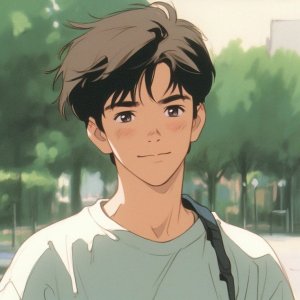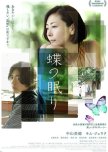Comfort movie ??
The movie is surely a familiar melodramatic stuff reminiscent of similar films such as “Iris” (2001) and “Still Alice” (2015), but director/writer Jeong Jae-eun handles his story and characters with care and consideration. At one point, the movie makes a little fun of Ryoko’s most famous work which was incidentally inspired by her crumbling relationship with her ex-husband, but it respects her artistic passion and dedication nonetheless, and that is why it is often poignant to watch her struggle to write through whatever is still left inside her mind. Although her relationship with Chan-hae initially looks clichéd, both of them are presented as human characters we can care about, and it is engaging to watch how their relationship is developed along the story.
The lead performers of the movie support the movie well with their good performance. Miho Nakayama, a Japanese actress who has been fondly remembered by many audiences in Japan and South Korea for her charming performance in “Love Letter” (1995), deftly handles a number of obligatory melodramatic moments in the film, and she is fabulous whenever she is required to express a lot of things via her beautiful face. On the opposite, Kim Jae-wook, a South Korean actor who has mainly worked in several South Korean TV dramas, is solid in his understated acting which effectively functions as the solid ground for his co-performer’s showier performance, and, as far as I heard from others, he did a fairly nice job of speaking Japanese with some necessary awkwardness as required.
Although it is not so different from many other neat Japanese melodrama films during recent years, “Butterfly Sleep” distinguishes itself to some degree via its interesting setting and sincere storytelling, and its overall result is both entertaining and touching enough for recommendation. It may be predictable, but this is a well-made movie packed with genuine feelings, and it certainly earns its tears in the end.
The lead performers of the movie support the movie well with their good performance. Miho Nakayama, a Japanese actress who has been fondly remembered by many audiences in Japan and South Korea for her charming performance in “Love Letter” (1995), deftly handles a number of obligatory melodramatic moments in the film, and she is fabulous whenever she is required to express a lot of things via her beautiful face. On the opposite, Kim Jae-wook, a South Korean actor who has mainly worked in several South Korean TV dramas, is solid in his understated acting which effectively functions as the solid ground for his co-performer’s showier performance, and, as far as I heard from others, he did a fairly nice job of speaking Japanese with some necessary awkwardness as required.
Although it is not so different from many other neat Japanese melodrama films during recent years, “Butterfly Sleep” distinguishes itself to some degree via its interesting setting and sincere storytelling, and its overall result is both entertaining and touching enough for recommendation. It may be predictable, but this is a well-made movie packed with genuine feelings, and it certainly earns its tears in the end.
Cet avis était-il utile?


 1
1 1
1




















